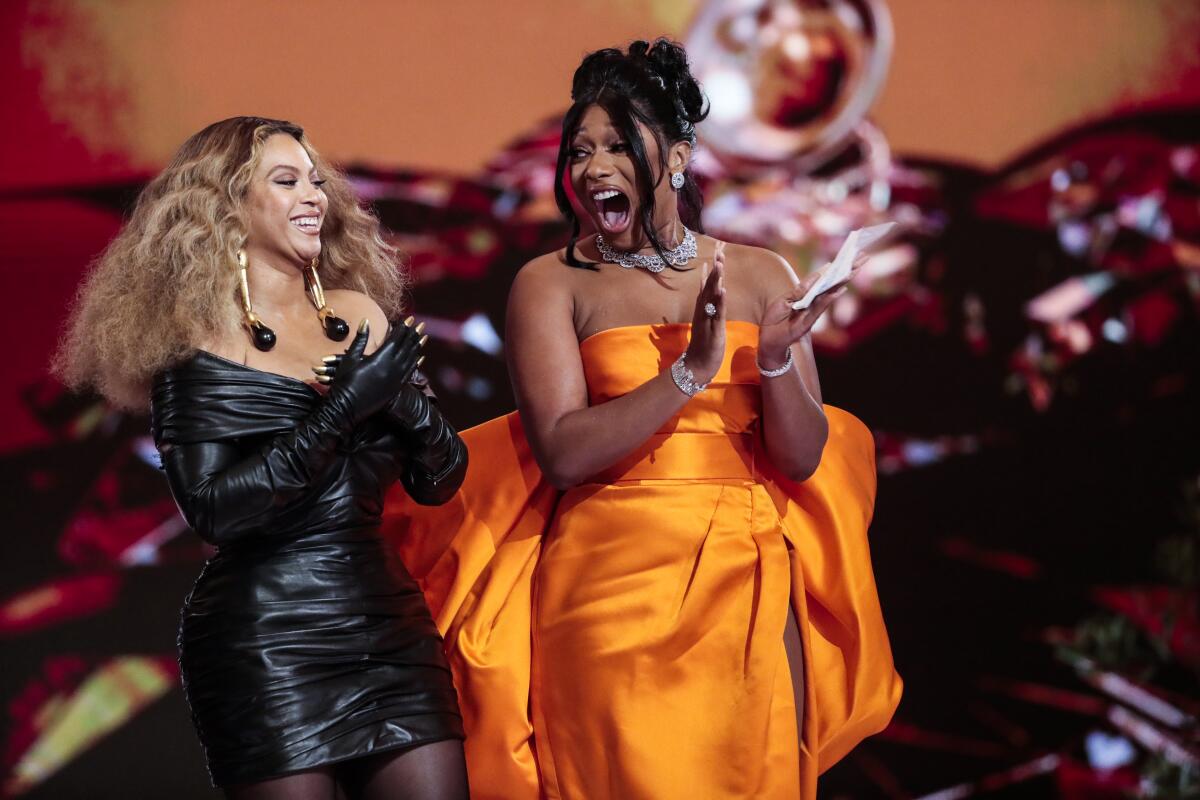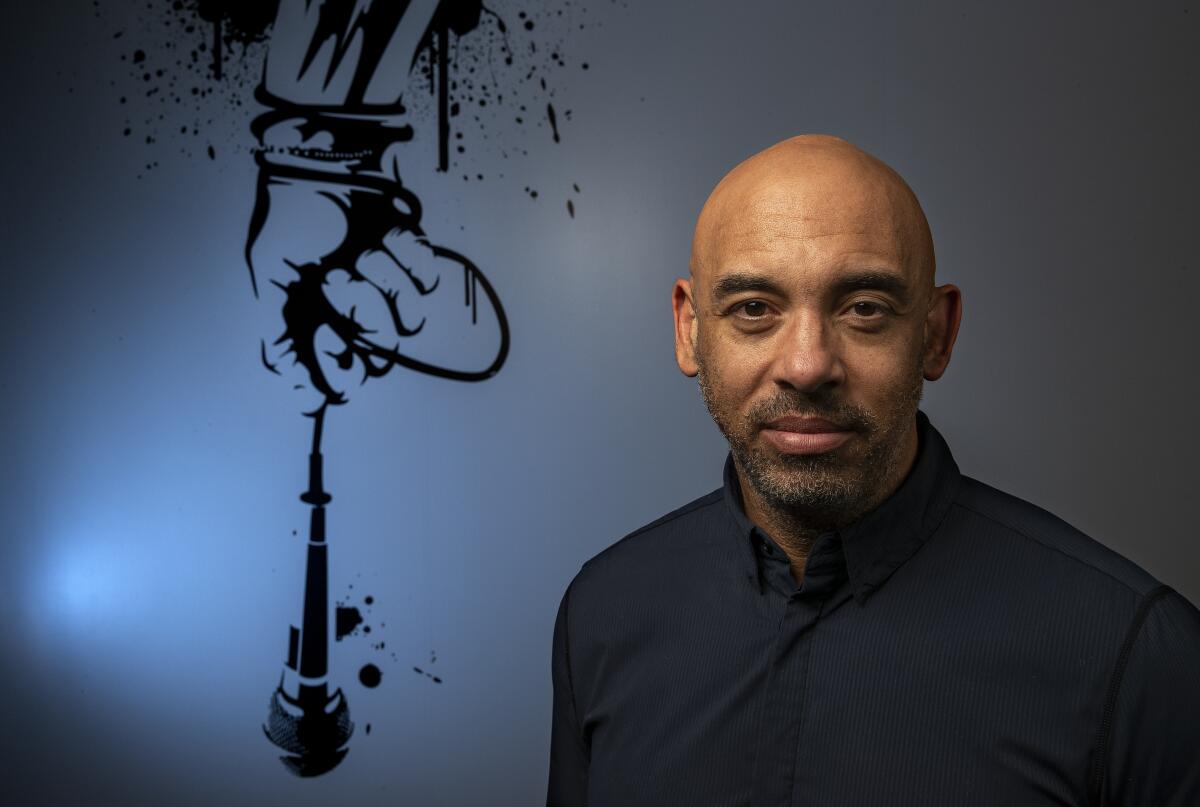Grammys eliminate secretive nominating committees in wake of controversial Weeknd snubbing

When the Recording Academy announced Friday that it was doing away with the secretive — and highly controversial — committees that shape nominations for the annual Grammy Awards, many in the music industry interpreted the move as a targeted response to the widespread outcry over the Weeknd’s shutout from this year’s ceremony.
Not so, according to the academy’s interim chief executive.
“It’s a long road to get to a transformative change like this,” Harvey Mason Jr. told The Times in an interview, adding that the academy convened a task force last summer to examine the committees, well before nominations for March’s 63rd Grammys were revealed. “It’s not something that happens quickly or in the case of a reaction to one event.”
In his new doc, ‘What Drives Us,’ Dave Grohl and a host of rock luminaries reflect on their salad days as young musicians touring the country by van.
Indeed, the academy had drawn criticism for years over its nominating process, which relied on small groups of anonymous insiders to oversee, and sometimes amend, the Grammys ballot from initial choices by the academy’s thousands of voters. The nominations review committees, as they were officially known, were introduced in 1989 ostensibly to ensure that nominations were properly categorized and that they accurately reflected the state of music in a given year.
But over time the committees’ work began to be seen as evidence of a problematic system in which insiders rewarded their friends and punished their enemies. More recently, a number of high-profile Black artists — among them Drake, Frank Ocean and Sean “Diddy” Combs — have suggested that Grammy nominations are tainted by institutional racism because hip-hop and R&B artists, though recognized in genre categories, are routinely overlooked for more prestigious awards like album, record and song of the year.
The complaints grew louder in 2020 after Deborah Dugan, the academy’s former leader, made explosive allegations of discrimination and vote-rigging in a lawsuit tied to her ouster from the organization. Then the Weeknd, one of pop’s biggest stars, was snubbed despite the success of his album “After Hours” and his smash single “Blinding Lights.”
In a tweet after nominations were announced in November, the singer said the Grammys were “corrupt” and that the academy owed “me, my fans and the industry transparency.” Later he said he planned to boycott the show going forward, specifically blaming the “secret committees” in a statement to the New York Times.
Asked how he’d respond to criticism that the slow-moving academy acts only when its hand is forced, Mason replied, “I would say change happens when our members decide it’s time for change. Our members submit the proposals, and then people vote on them. It’s what the membership wants, asks for and votes for.”
Al Schmitt, who holds the record for the most Grammy wins in the engineering category with 23, has died at 91.
Reaction in the music business was largely positive, with many saying the academy’s elimination of the committees was long overdue. Yet others expressed skepticism that conflicts of interest inside the organization would suddenly disappear from the voting process.
“I think Harvey’s heart is in the right place, and I think it’s a step in the right direction,” said Lenny Beer, editor in chief of the trade journal Hits, who wrote an impassioned post in November concluding that the Weeknd had been “purposely excluded” from this year’s nominations. “I hope these changes prove to be real and true. And I’ll believe it when I see it.” A representative for the Weeknd didn’t respond to a request for comment.
Of the skepticism, Mason said, “Some people probably will never be satisfied,” and insisted that the nominating process will be straightforward from now on: “Our 12,000 members will vote, and the top eight vote-getters will be our nominees” in the four major categories of album, record and song of the year as well as best new artist. In the Grammys’ dozens of genre categories, the top five vote-getters will be the nominees, he said.
“There’s no avenue or opportunity to adjust the number,” he added.

The committees’ elimination was one of several rule changes the academy announced Friday, along with a reduction from 15 to 10 in the number of genre awards members are allowed to vote on and a rearrangement of the so-called craft categories — which honor production, packaging and the like — into two fields. (Review committees will continue to shape nominations in those categories.)
The academy also said two new awards, for best global music performance and best música urbana album, would be handed out for the first time at the 64th Grammys, scheduled for Jan. 31, 2022. Recordings eligible for consideration must be released between Sept. 1, 2020, and Sept. 30, 2021.
Mason said he was pleased by warm reviews of this year’s ceremony, which featured big wins by Taylor Swift, Beyoncé, Megan Thee Stallion and Billie Eilish and which marked executive producer Ben Winston’s debut as the show’s creative head after 40 years with Ken Ehrlich at the helm.
“It wasn’t an easy show to produce, and it wasn’t an inexpensive show to produce,” Mason said, referring to COVID-19 protocols that affected virtually every aspect of the telecast. But he approved of the “intimate quality” of the show and said he was eager to see what Winston and his team would do under more normal circumstances.
Viewership for this year’s CBS telecast set a record low, with 9.2 million viewers, a drop of more than 50.6% from the previous year, a trend in keeping with nearly all major awards show in the current cycle.
Next year’s Grammys ceremony is unlikely to happen on Mason’s watch. The executive, who stepped into his role on an interim basis after Dugan’s departure, said the search for the group’s next leader has yielded “several great finalists” and that he expects the academy to meet its stated goal of having a new CEO in place by the end of May or beginning of June.
“Surprisingly,” he said, “I think we’re on schedule.”
More to Read
The biggest entertainment stories
Get our big stories about Hollywood, film, television, music, arts, culture and more right in your inbox as soon as they publish.
You may occasionally receive promotional content from the Los Angeles Times.












